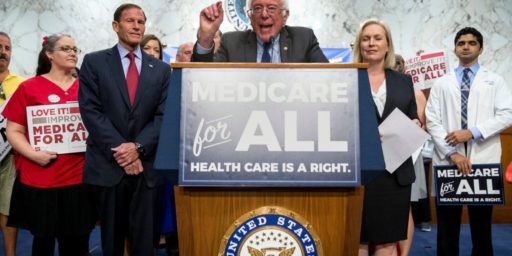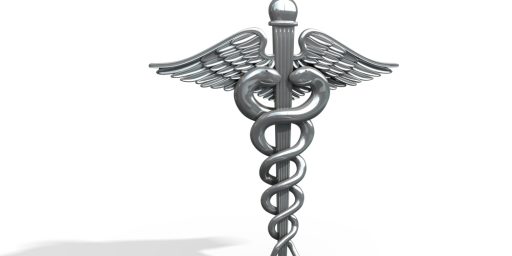Buh-Bye Public Option
The Obama Administration may be dropping the public option requirement from its health care agenda.
PHOENIX — The White House, facing increasing skepticism over President Obama’s call for a public insurance plan to compete with the private sector, signaled Sunday that it was willing to compromise and would consider a proposal for a nonprofit health cooperative being developed in the Senate.
Along with mounting skepticism President Obama has been seeing his poll numbers drop as well. Similar to what happened to President Clinton when he tried to pass health care reform the public backlash is causing President Obama to re-evaluate and re-trench.
The “public option,” a new government insurance program akin to Medicare, has been a central component of Mr. Obama’s agenda for overhauling the health care system, but it has also emerged as a flashpoint for anger and opposition.
Right, not like there is no savings to be had in Medicare…oh wait….
Second, reform will finally bring skyrocketing health care costs under control, which will mean real savings for families, businesses and our government. We’ll cut hundreds of billions of dollars in waste and inefficiency in federal health programs like Medicare and Medicaid and in unwarranted subsidies to insurance companies that do nothing to improve care and everything to improve their profits.
That was what President Barack Obama wrote in his New York Times op-ed this weekend. This immediately raises the question…why the public option? If we can save not just billions, but hundreds of billions by cutting waste, fraud and abuse in Medicare and Medicaid…why not do that first? Why not put out a bill for doing that separate of the public option? Could it be there is an ulterior motive? Hmmm, a politician being dishonest and misleading…nawww couldn’t happen.
I see this as a good move. President Obama has come out in favor of single payer health care like we see in Canada and England. The problem is that while on the accounting ledger both systems are cheaper, they also have had issues with waiting for procedures (more here and here). Given that health care resources are scarce and costs are rising quite fast in these countries making people wait for care for issues that are non-life threatening is a good way to control costs.
It is much like externalities. These costs are not represented anywhere really in terms of money. However, if a person is sitting at home waiting for treatment and is in pain, has diminished mobility, etc.—i.e. a diminished level of welfare due to lack of treatment it is still a cost for society. It really isn’t all that different than having an insurance company denying a claim again and again before finally paying for the care. The difference is that with an insurance company you can take them to court and ask the government to make a decision. With a government run health care system if the government tells you to go home and not come back for 12 weeks is complaining to the government going to get you very far?
The public option has never been essential. When looking at some of the more successful European models such as the Netherlands and Switzerland don’t have public options. The government is still heavily involved in health care, but the requirement is that individuals purchase health care from private insurance firms. And it was seen by many that the public option was a way to backdoor a single payer system. First introduce the public option, then down the road start subsidizing it and squeeze out the private insurers.






My inner Machiavelli whispers to me: Well, see, what you do is put something in there guaranteed to freak out the Republicans. Then, when the pantybunching reaches a certain threshhold, you say, “Ok, we’ll take that out. Now, will you support the bill?” The Republicans, of course, have no intention of supporting any bill written by Democrats. So now you can say, “See, we’re willing to accomodate that very serious objection, but even then, they refuse to go along.” Bad Republicans. So much for bipartisanship, we’ll just pass this sucker without them.
In all honesty, Steve, I think that President Obama is thinking more of a system like that of France or Germany rather than a fully socialized one like BNHS or a decentralized socialized one like Canada’s.
In all honesty, he appears to have said that if he could do it all over, he’d go single payer…not like France, the Netherlands, Switzerland, or most of the other European countries that are doing best out of the lot…instead he wants to go with some of the worst systems in Europe.
Good pick-up, Steve. I’d read the op-ed (and posted about it) but I didn’t notice that whopper.
The statement is either poppycock or framed over such a lengthy period as to be meaningless.
The total spending on Medicare and Medicaid is such that, for there to be hundreds of billions in waste, fraud, and abuse annually a significant fraction (as in at least a third) of the total would have to be waste, fraud, or abuse.
I know of no evidence that’s the case and I have never heard that claim before.
It would be a perfectly easy thing to craft a public option that had no artificial advantage over competing private plans. If the public option were required to be financed solely through premiums, and any deduction or credit equally applicable to private plans that offered the same coverage, then that would be a perfectly level playing field. There would also be no slippery slope from such a plan to a single payer system.
If the public option didn’t have these features that would be a fair reason to oppose it. But there’s nothing inherent in the idea of a public option that advantages it over competing private plans.
That a plan with more subscribers can drive a harder bargain with providers does not betoken an uneven playing field, but is precisely one of the competitive advantages that a level playing field would be likeliest to tease out.
No, kth, it really wouldn’t be that easy. The public plan won’t have to contend with the state insurance commissioners. Insurance companies do, and will continue to be required to. There’s a substantial fraction of the total current waste right there that could be eliminated very easily.
Phil, that’s an argument for consolidating the regulatory regime (which I would totally support), not for blanket opposition to a public option. The regulation at the federal level will reduce much of the state-to-state variation anyway.
I’ll be happy enough if mandatory coverage combined with community rating is enacted, even if the public option fails. I’m only pointing out that the stated objections to a public option aren’t insurmountable.
The public option plan that was proposed by the House seemed to me to undeniably be a plan aimed at ending private insurance.
1. Premiums are set by income level. People making up to four-times federal poverty level ($88,000 for a family of four) have their premiums capped by the legislation. The CBO presumes that the federal option would generally be cheaper for people than private insurance.
2. Businesses that don’t provide health care coverage are penalized 8% of payroll. However, most businesses that provide healthcare coverage currently pay 11% – 14% of payroll. The penalty for smaller businesses is less than 8%. From this I believe most businesses, particularly small businesses, would drop existing healthcare coverage and encourage employees to sign for the public option.
3. The public option would pay Medicare rates, plus five percent. Any cost savings would be from negotiating lower Medicare reimbursement rates, which raises the question, why wait?
I didn’t see anywhere in the CBO’s discussion of the plan that the public plan would need to be actuarially sound and spend no more than it takes in. If this is not a free pony for everyone, it’s certainly a stalking horse to end the viability of the private insurance market.
Actually, kth, it can most definitely be part of an argument against a public option. If fraud and waste are issues, 50 separate regulatory commissions are one very simple area of waste to eliminate – unnecessary multiplication of regulatory entities, regulations, and the concomitant multiplication of insurance contracts (with increased overhead). Start there, and with other fairly obvious areas, before you decide to create a new bureaucracy with its attendant expenses. Sorta like what Mackey said t’other day.
If the public option is in fact aced out in the end, let me just note that the right wing marked the moment by rejoicing that tens of millions of people will remain without health insurance coverage. What benefit do you get out of maintaining the status quo, exactly? Is it good for the insurance companies, and you identify with any corporation who screws people over? Or do you just think the uncovered people are “undeserving”?
Either way, your moral bankruptcy is showing.
Not taking an unsustainable and dysfunctional system and making it even less sustainable and more dysfunctional? Just guessing.
“3. The public option would pay Medicare rates, plus five percent. Any cost savings would be from negotiating lower Medicare reimbursement rates, which raises the question, why wait”
In general, medicare pays about 80% of private insurance payments for most specialties, though it goes as low as about 33% for a few. This change would reduce some costs.
Does anyone know if doctors/hospitals would be mandated to accept this insurance?
“We’ll cut hundreds of billions of dollars in waste and inefficiency in federal health programs like Medicare and Medicaid”
All the numbers are pretty much being cited for ten year periods, including the trillion dollar number tossed around. I would assume the same here. IIRC, it was actually asserted we could save $500 billion over ten years.
Steve
Mithras- I got mine is the idea here.
Steve
No, they wouldn’t be required.
To be clear, this is a House plan that included a public option. I’m not even sure looking back at it that it passed the House or has already died. It went far enough in specifics that the CBO could be requested to analyze it though.